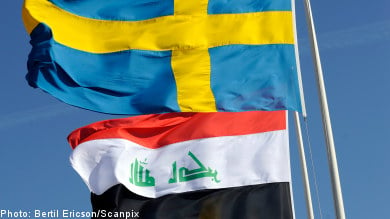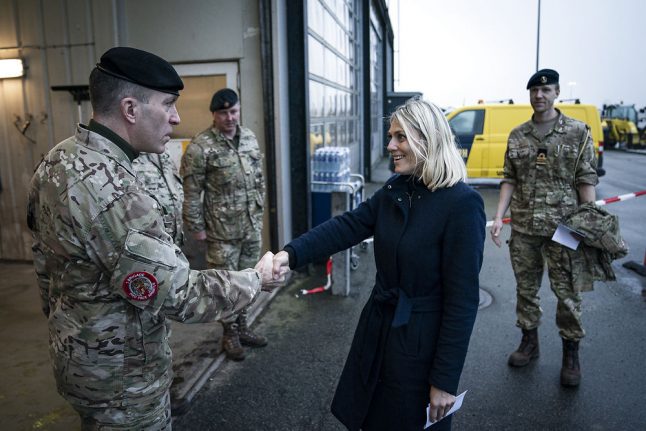Even before Thursday’s International Compact with Iraq (ICI) conference got underway outside of Stockholm, the Swedish papers were speculating about what significance, if any, the meeting would have for Iraq—and for Sweden.
Writing on Tuesday , the Göteborgs-Posten (GP) newspaper asserted that the conference was “one of the most meaningful” every hosted by Sweden, and it felt the subject of the meeting—charting the path forward for Iraq—was an important one.
Bowing to critics who saw the conference as part of a process which will allow the United States and Britain to shirk their responsibility for finishing what they started, the paper admitted there are reasons to criticize the war in Iraq.
However, that doesn’t excuse other countries from lending a helping hand, argued GP.
“Exactly how big a step forward may be taken in practice at the conference is unclear…but every step forward is valuable,” said GP.
While newspapers addressed a variety of topics in their editorial pages following the meeting, one theme did emerge: the continued impact that Sweden’s large Iraqi population will have on shaping relations between the two countries in the years to come.
Writing for the Expressen newspaper, Anna Dahlberg has kind words for the way Prime Minister Fredrik Reinfeldt handled himself as host of the conference, and for being ”surprisingly direct” with US Secretary of State Condolezza Rice about her country’s responsibility to accept more Iraqi refugees.
”The question is whether Reinfeldt was clear as he needed to be with the Iraqi Prime Minister Nuri al-Maliki during the day’s tête-à-tête,” writes Dalhberg.
“After all, that’s what the Swedish debate ought to be about this week—how our relationship with Iraq looks.”
Dahlberg thinks things are looking up in Iraq, and that Sweden ought to be a part of the action.
“Sweden is obviously right to re-open the embassy in Baghdad and to serve as host to the Iraq conference. With 100,000 Iraqis in the country, it is in our interests to be engaged in Iraq’s future. But Sweden shouldn’t uncritically embrace Iraq’s government. As has been said, it has a lot left to prove.”
Dagens Nyheter (DN) took on a different topic in its post-conference editorial, reflecting instead on how far the Bush administration has come in its perception of the international community since launching the war in Iraq in 2003.
Referencing statements by Rice, DN found it significant that the United States government now sees the international community as vital to the future of Iraq.
“What the statement illustrates, however, is that throughout the current Bush administration there is an insight which was conspicuous in its absence five years ago. Then the ‘international community’ was simply a troublesome detail which could be ignored,” according to DN.
DN sees hope that US foreign policy is headed in a new direction, regardless of who succeeds George W. Bush in the White House.
“After too many years of arrogance, unilateralism, a lack of respect for international organizations and international agreements, we can finally see a more cooperative superpower after the presidential election in November,” writes the paper.
Svenska Dagbladet (SvD) columnist Claes Arvidsson started his analysis by taking on a different foreign policy issue when it comes to the future of Iraq: relations with Iran.
According to Arvidsson, Iran poses the biggest foreign policy challenge for Iraq.
He calls the former the “biggest winner in the political aftermath from the overthrow of Saddam Hussein.”
Arvidsson laments one really significant conversation which never took place at the Iraq conference—a face-to-face meeting between the foreign ministers of Iran and the United States.
”Sooner or later it is a must to raise contacts [between the two countries] to that level. No matter how much we may want to, we can’t ignore Iran,” he writes.
He then goes on to criticize Iraq’s Arab neighbors for their “lukewarm” engagement with the country, arguing it is the wrong way to counter a threat from Iran or support a better future for Iraq.
Neverthelsess, Arvidsson concludes that the conference was significant for Sweden, and a success for Reinfeldt and his foreign policy team.
”When Fredrik Reinfeldt, Carl Bildt, and Gunilla Carlsson cool down following the ICI, they can refresh themselves with the additional foreign policy points they’ve earned. It’s fun for them and good for Sweden. Through the huge influx of refugees, Sweden also has a direct interest in having Iraq develop in a way which makes return more than a dream,” he writes.
In its review of the meeting, the Sydsvenskan newspaper first took a biblical tone, pointing out that “no miracles were performed” at the ICI meeting.
After all, writes Sydsvenskan, Fredrik Reinfeldt, “despite everything, can’t walk on water.”
The paper is at first rather pessimistic about Iraq and hints that the conference perhaps painted too rosy a picture the situation in the war torn country.
“The political split between the Shiites and the Sunnis remains. Corruption is widespread. The situation for women and minorities continues to be tough. The list could go on,” writes the paper.
Despite all the difficulties, however, Sydsvenskan does find reason for hope.
The economy is growing, oil production is increasing, and things can continue to improve as long as the security situation gets better.
“And that will take time,” according to Sydsvenskan.
“Time and a huge effort. The responsibility is primarily the Iraqis’. But they need support.”
Rather than miracles, says Sydsvenskan, Iraq needs concrete steps forward like the opening of foreign embassies in Baghdad, additional investment, and debt reduction.
“A number of promises have been presented. Hopefully they will come to be realized.”
The paper concludes by emphasizing the close ties the now exist between Sweden and Iraq on account of the high number of Iraqi refugees now in Sweden. According to Reinfeldt, a full one percent of the Swedish population has Iraqi heritage.
“Iraq is closer to us than what a quick look at the map might suggest. In a globalized world nations are bound together, regions and continents fates are overlap all the more. Therefore it’s in the international community’s interests that Iraq is stabilized, that the fumbling democratic development can continue so that the country—in practice for the first time—ban be an integrated part of that community.”
Where the main newspapers stand:
Dagens Nyheter, “independently liberal”, Stockholm-based, owned by the Bonnier family.
Svenska Dagbladet, “independently liberal-conservative”,
Stockholm-based, owned by Norwegian media company Schibsted.
Göteborgs-Posten, “independently liberal”,
Gothenburg-based, owned by the Stampen media group.
Sydsvenska Dagbladet (Sydsvenskan), “independently liberal”, Malmö-based, owned by the Bonnier family.
Aftonbladet, “independently Social Democrat”, Stockholm-based, owned by trade union federation LO and Norwegian media company Schibsted.
Expressen, “independently liberal”, Stockholm-based, owned by the Bonnier family.



 Please whitelist us to continue reading.
Please whitelist us to continue reading.